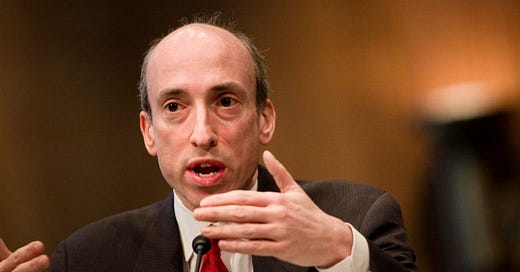Hey👋
Welcome to the mesha tribe: a biweekly newsletter by mesha that brings you all the latest developments in Crypto, NFTs, and Web3 to help you take your net worth #ToTheMoon🚀
We’re inviting 1,000 early access users to team up and buy NFTs with Mesha. Create a team wallet, invite your friends, and split the costs (including gas) across the team.
Benefits:
An original NFT designed by Mesha
100,000,000 $MESHA tokens allocated for early access
Periodic giveaways of blue-chip NFTs to our first 1,000 users
Early access is open to anyone in our community who has reached Level 4, or higher. Get involved in our Discord, share your favourite NFTs, and meet your next teammates!
Sounds good? Sign up below👇
Great! Let’s get started.
The Big Story
Over the past few years, nations and institutions worldwide have been consistently pushing for regulation of the crypto markets, which recently witnessed unprecedented growth. But no other country has pursued it as aggressively as the US, which now seeks to double down on its efforts.
In a virtual address at the University of Pennsylvania Carey Law School, the US Securities and Exchange Commission (SEC) Chair Gary Gensler said that the agency is finding ways to regulate the roughly $2 trillion crypto market in hopes of shielding investors from an onslaught of scams.
The agency's focus lies on three key areas -
1. Platforms
Recently, trading on centralized and decentralized crypto trading and lending platforms has reached $100 billion a day, with the top 5 crypto exchanges facilitating 99% of the trades. What’s more, a typical trading platform supports trading of at least a dozen, if not hundreds, of tokens. Gensler said that such platforms need to be controlled as many of them are trading securities, similar to traditional exchanges.
“We do our best within our authorities to protect the public, but until and unless the platforms are actually registered and regulated, I don’t think the tokens will significantly come in and register. The platforms really ought to register; it’s in their long-term business interest.”
2. Crypto Tokens
So far, more than 5,000 crypto tokens are in their early stages, and the general public is investing in them in hopes of earning profit — which Gensler said fits the definition of an "investment contract" or "security" under the Supreme Court’s 1946 Howey Test.
While crypto exchanges offer crypto commodity tokens and crypto security tokens, the SEC's jurisdiction is only limited to securities. So, to expand its control, Gensler has asked his staff to work alongside the Commodity Futures Trading Commission — the regulator of US commodities — to explore methods "to register and regulate platforms where the trading of securities and non-securities is intertwined."
3. Stablecoins
Last September, Gensler commented on stablecoins, saying they're "almost like poker chips at the casino,” as many aren't pegged to the dollar. On Monday, Gensler carried the same sentiment forward, saying that the $183 billion stablecoin market presents three main issues: financial stability, investor protection, and illicit trading.
His remarks come a week after the SEC proposed new accounting rules that would protect crypto assets held by companies for users against hacking losses. Last month, President Joe Biden signed a crypto executive order, calling on federal agencies to study the “responsible development” of digital assets.
People aren't happy
As expected, crypto enthusiasts took to Twitter to express their discomfort with the news. While the SEC may be acting in good faith, users saw it as an attempt to control the narrative surrounding crypto markets. Some even mocked the agency’s inability to regulate the stock markets, where a company like Sears, which went bankrupt four years ago, is now up 122%.
Having said that, Gensler's address isn't surprising as the agency has consistently taken an anti-crypto stance for years, gathering criticism from both the crypto community and US lawmakers, who said that regulatory crackdowns stifle the massive innovation potential of blockchain technologies.


Then there’s the SEC's ongoing lawsuit with Ripple, where the government agency has accused the blockchain firm of raising $1.3 billion in unregistered digital asset securities via its native token XRP, which has compelled many to question the SEC's true motives. But you don’t have to wait that long as the whole case is now being made into a documentary that's set to launch in the metaverse.
Broadly speaking, what Gensler did was re-emphasize the call for a comprehensive regulation that not only protects investors but also allows the crypto market to flourish with clear rules. “Let’s not risk undermining 90 years of securities laws and create some regulatory arbitrage or loopholes,” he concluded.
Share what you learn 🤝
Found this newsletter insightful? Well, then subscribe and share it with your friends and colleagues.
We, at Mesha, believe in democratizing finance. Join us and share your thoughts with our growing community.





